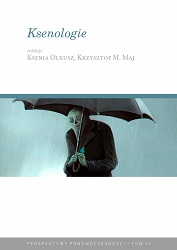Teraźniejszość jako barbaricum. Strategia wyobcowania poznawczego i rola czasu historycznego w Star Treku
The Present As Barbaricum. Cognitive Estrangement and Historical Time in "Star Trek"
Author(s): Agnieszka Urbańczyk
Subject(s): Politics / Political Sciences, Social Sciences, Fine Arts / Performing Arts, Theory of Literature
Published by: Ośrodek Badawczy Facta Ficta
Keywords: Star Trek;cognitive estrangement;future;time;history;politics;Critical Theory;science fiction
Summary/Abstract: In “The Present As Barbaricum. Cognitive Estrangement and Historical Time in »Star Trek«” Agnieszka Urbańczyk examines the critical potential of conceptualization of time in “Star Trek: The Original Series”. The aforementioned production is treated here as a symptom of the 1960’s social change or as a one of its catalysts. The franchise’s creators use a strategy which a decade later Darko Suvin would call ‘cognitive estrangement’. As Suvin points out, the science fiction genre makes it possible for known elements of recipient’s empirical reality to stand out and, thus, become a subject of critical reflection. One of the key factors in establishing cognitive estrangement is conceptualization of the created fictional world as subjected to history and time-flow so that specific norms may be perceived as contextual and not absolute. “Star Trek” is shown as balancing two strategies of establishing the future: an apocalyptic extrapolation—which is supposed to be a warning—and cognitive estrangement. In many ways the series was extremely subversive for its time, advocating tolerance and a world without racism or xenophobia. Its political message is conveyed mostly through its perception of time. The twenty-third century is not a foreseeable future (extrapolation), but, rather, an exotic place where the world is radically different from the actual one (at the time of the series’ creation). The characters look back at the Earth’s history to find it unsatisfactory and with aid of their displaced perspective so may do the audience.
Book: Ksenologie
- Page Range: 413-429
- Page Count: 17
- Publication Year: 2018
- Language: Polish
- Content File-PDF

